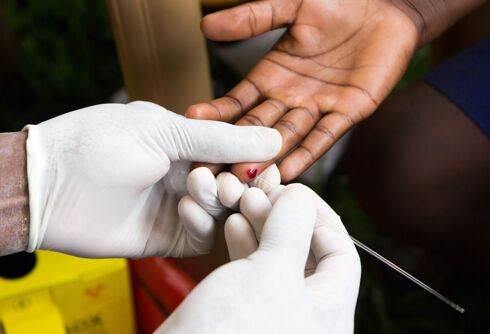On Thursday, Kansas Gov. Laura Kelly (D) vetoed a slate of anti-trans bills passed by the Republican-dominated legislature.
One bill seeks to ban trans people from using bathrooms and other public facilities that align with their gender identity, and another attempts to ban gender-affirming care for trans youth. A third would ban trans students from rooming with cis students on overnight school trips, and a fourth would require trans prisoners to be housed based on their sex assigned at birth.
Related:
Montana GOP bans the only transgender house member from speaking for the rest of the session
She was accused of using “inappropriate and uncalled-for language” while defending trans youth.
In a statement on her vetoes, Kelly blasted the bills for taking away trans people’s rights and for their potential to hurt the Kansas economy.
“Companies have made it clear that they are not interested in doing business with states that discriminate against workers and their families. By stripping away rights from Kansans and opening the state up to expensive and unnecessary lawsuits, these bills would hurt our ability to continue breaking economic records and landing new business deals. I’m focused on the economy. Anyone care to join me?”
Never Miss a Beat
Subscribe to our newsletter to stay ahead of the latest LGBTQ+ political news and insights.
For at least three of the four bills, the legislature appears to have enough votes to override Kelly’s vetoes. The bill on gender-affirming care is the only one that may not, as 14 House Republicans voted against S.B. 26, which would ban all forms of gender-affirming care – including reversible puberty blockers – for those under 18.
The Human Rights Campaign (HRC) praised Kelly for vetoing the legislation.
“Today, Governor Kelly did the right thing,” said HRC state legislative director and senior counsel Cathryn Oakley. “By vetoing a series of bills designed solely to discriminate against LGBTQ+ – particularly transgender – Kansans, she rejected the politics of hate and division being perpetrated by the state legislature, all while keeping her focus on the issues that really matter. She’s right that discrimination is bad for business, bad for Kansas, and bad for this nation.”
Earlier this month, the Kansas GOP succeeded in passing an anti-trans sports ban that many worry will lead to invasive and traumatic genital examinations of student-athletes.
Lawmakers overrode Kelly’s third veto of the “Fairness in Women’s Sports Act,” which bans transgender girls and women in kindergarten through college from participating in girls’ and women’s school sports.
“It breaks my heart,” Kelly said in the wake of the bill’s passage. “I’m sorry that they distracted themselves with this really awful bill.”
“It won’t increase test scores. It won’t help any kids read or write,” she wrote in her veto message. “It won’t help any teachers prepare our kids for the real world. Here’s what this bill would actually do: harm the mental health of our students.”
Kelly has long championed LGBTQ+ rights. When she first became governor in 2019, her first official act in office was to sign an executive order to restore protections for LGBTQ+ state employees.
“Discrimination of any kind has no place in Kansas,” Kelly said on her official Twitter account. “It will not be tolerated.”
Don't forget to share:
















